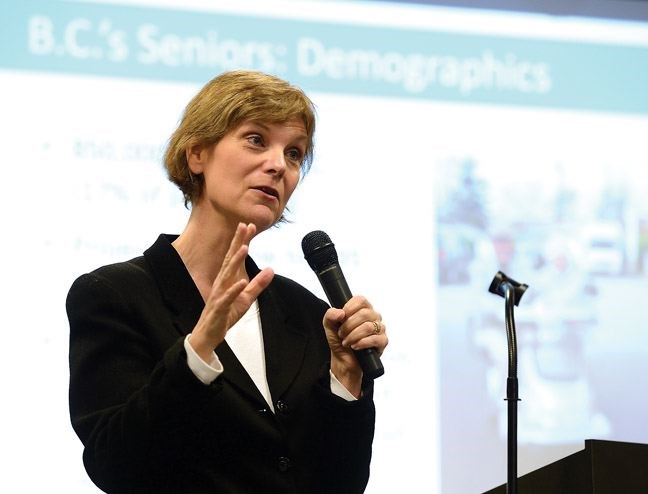It's not forever but it's deadly serious.
That's what B.C. Seniors' Advocate Isobel Mackenzie is saying about the COVID-19 pandemic and how seniors need to self-isolate to be safe.
B.C. residents who are 80 years and older are more vulnerable as it is a respiratory illness. The mortality rate for seniors 80 years and older who get COVID-19 is 15 per cent, which is the same percentage that is seen for pneumonia but she stressed that these are early days for statistics on this new illness.
In response to the Provincial Health Officer's limit of public gatherings, the Prince George seniors' centres are now closed. These centres have memberships of more than 1,000 people and some of them rely heavily on the midday meal provided at low cost from Monday to Friday. Along with getting nutrition at the centres, many socialize during time spent at the centres. Finding themselves with nowhere to go and self-isolating at home poses a mental health risk as well as a nutritional challenge for many.
"The message to the whole Prince George community is we're coming together now, it's neighbour helping neighbour, really reach out to the elderly people you know in your life, whether they are family, neighbours, friends, the person you go to church with, the person you met at the senior centre and that senior centre is now closed," Mackenzie said. "Don't assume they're OK. Reach out, try to get phone numbers, knock on a door, leave a note under a door with your phone number - 'give me a call, I want to make sure you're OK.' Once you establish those connections you can continue those connections."
There will be heightened anxiety amongst some seniors because COVID-19 is most serious for seniors, she added. Those most vulnerable among the elderly have COPD, asthma, heart disease, diabetes and compromised immune systems.
"We are telling people, particularly older seniors, not to go out to the grocery store if you can avoid it because you're at higher risk if you contract it," she said. "And even if they are capable of going out to the grocery store we're telling them not to go."
As far as dealing with the anxiety caused by knowing there is a risk, Mackenzie encourages seniors to talk to others about their concerns.
"Now at times talking to others can increase anxiety - depending on what the other person says and where the conversations goes," Mackenzie laughed. "But I think it's the fear of the unknown. We don't know how long this is going to continue - we know it's not going to be forever, we do know that. We do know that it's probably going to be more than a few days, more likely a few weeks to a couple of months."
People are worried about things that have not happened yet, she added. For instance, they haven't run out of groceries yet but they will. They haven't run out of their medications yet.
"But they're going to at some point, right?" Mackenzie said. "So if connections in the community are established neighbour to neighbour, family member to family member to say 'I'll go and get your groceries for you and I can put them away for you or even drop them off at the door for you' and 'I can go pick up your medications and bring them to you, I can make up some meals and bring them over.'"
That's the calm reassurance seniors need so they can feel good about being isolated for their health's sake.
Mackenzie said it's of the utmost importance that seniors stay connected to the community even if it's just a phone conversation.
The Prince George Council of Seniors has sent their volunteers home from the resource centre but the four staff members are in the closed-to-the-public office answering questions by phone Monday to Friday from 9 a.m. to 3 p.m. and the Friendly Phone Call program is in full swing as volunteers are working from home and are open to more seniors looking for some conversation. To request a friendly phone call, seniors can call 250-564-5888.
Other seniors will need help of a different kind.
"Some seniors will just need people to look things up on the internet for them," Mackenzie said.
She ended with a specific message to seniors:
"This is not forever so please self-isolate," she said to seniors. "This isn't for the rest of your life, this is just for a few weeks but we can deal with this and the issues it presents in order to keep ourselves safe and if not for ourselves for our loved ones - our loved ones want us to keep ourselves safe as well."



